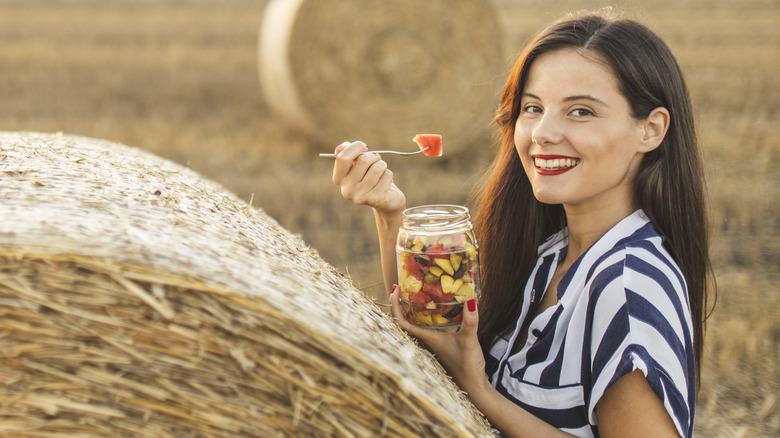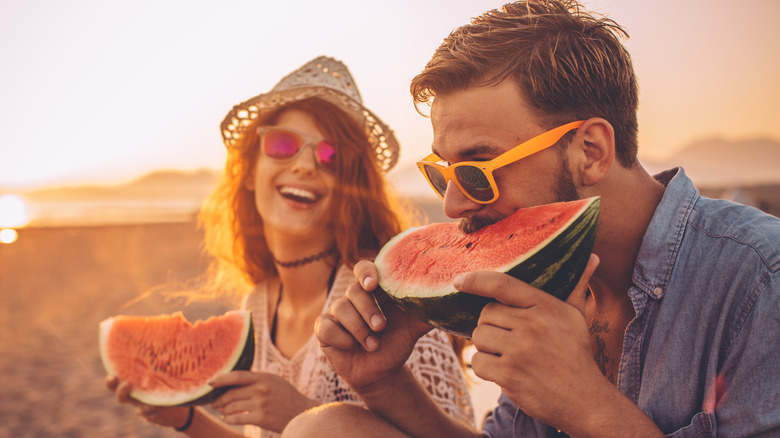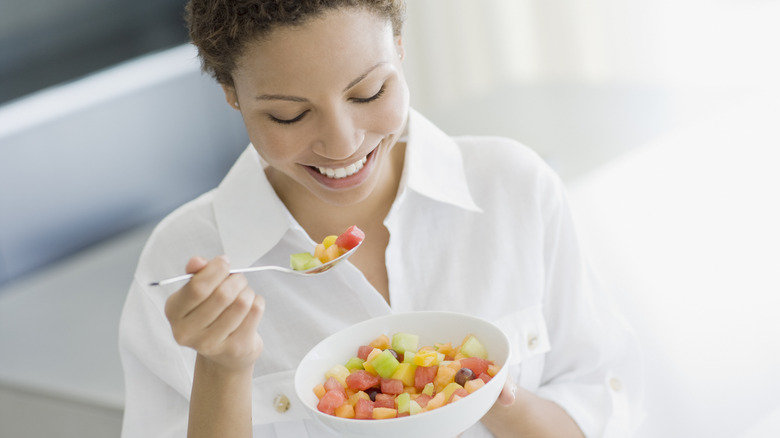The Three Best Fruits To Eat For Increased Hydration All Summer Long
Summer often means trips to the beach, backyard barbecues, and scorching hot temperatures. Even if you're pretty diligent about drinking enough water during the day, it's easy to get dehydrated when the mercury rises during the day. You lose more fluids when it's hot because you're sweating to keep yourself cool, according to The Independent. The old standard is 8 glasses of water a day — but you'll need 12 or 13 glasses when it's hot out.
However, determining how much water you need each day can depend on your body weight, says UCLA Health. A rule of thumb is about half an ounce to an ounce of water for each pound of body weight. You'll probably need more if you exercise and spend time outside in the heat (or both). That's quite a lot of water.
Rather than hop on the divisive WaterTok trend, you can meet about 20% of your hydration needs through your food. Foods such as fruits and vegetables have a good amount of water in them while also being low in calories. Cucumbers and iceberg lettuce are almost all water. But the three best fruits to help keep you hydrated are watermelon, strawberries, and cantaloupe.
Hydration in fruits
A cup of diced watermelon has 139 grams of water, which means it is 91% water. In other words, it's almost like drinking a cup of water with added nutrients (such as vitamin C, vitamin A, magnesium, and potassium). Watermelon also has just 45 calories, and its antioxidants, plant compounds, and amino acids can ward off tumor growth, heart disease, and inflammation (via Healthline).
Water also makes up about 91% of raw strawberries with 53 calories. Strawberries will not only fill you up with their water content, but they will also provide about 3 grams of fiber. The red beauties have flavonoids that can prevent brain inflammation, which is associated with memory loss (via WebMD). With more vitamin C than an orange, strawberries can help reduce your risk of cancer, diabetes, and stroke.
Cantaloupe can help you meet your summer hydration needs with its 90% water content. It has just 60 calories in a one-cup serving plus antioxidants like beta carotene, selenium, lutein, zeaxanthin, and choline. Lutein and zeaxanthin help protect your eyes, and beta-carotene works with other antioxidants to protect your cells against oxidative stress (via Medical News Today).
Staying hydrated through the summer
If you know you're going to be outdoors in the hot sun, adding fruits to your morning breakfast can help start your day hydrated. According to the Centers for Disease Control and Prevention (CDC), it's best to get some hydration in well before the temperatures begin to rise. In other words, starting your day with a hydration deficit will only make it harder to keep up your hydration.
You'll need a cup of water every 15 to 20 minutes under high temperatures. It's best to sip at regular intervals than gulp a ton of water at once. Drinking too much water at once puts you at risk for hyponatremia, where there's not enough sodium in your system to balance the large amounts of water. This can make your cells swell up and could impact your brain (via the National Kidney Foundation).
Because your body also loses electrolytes as well as water through your sweat, you can replenish these electrolytes through fruit. Although fruit is relatively low in sodium, fruits such as watermelons and strawberries have calcium, magnesium, and potassium that will keep your muscles and nerves contracting as they should (via Women's Running).



